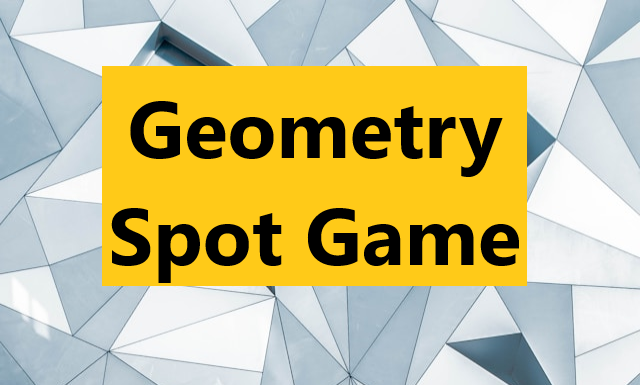In the vast landscape of gaming, there exists a captivating genre that seamlessly blends visual aesthetics, challenging puzzles, and educational value: Geometry Spot Games. This article serves as your guide to delve into the enchanting realm of Geometry Spot Games, uncovering their core elements, unique aspects, and impact on cognitive skills.
Introduction to Geometry Spot Games
Geometry Spot Games immerse players in a world of geometric shapes and patterns, challenging them to spot specific shapes or objects within intricate designs. From tessellations to optical illusions, these games captivate players with their visually stunning landscapes and engaging gameplay mechanics.
Understanding the Core Elements of Geometry Spot Games
Geometry Spot Games are characterized by several key elements that contribute to their appeal and gameplay experience:
Visual Aesthetics: Central to Geometry Spot Games is their visually captivating designs, featuring vibrant colors, intricate patterns, and mesmerizing compositions that draw players into the game world.
Challenging Puzzles: Each level presents players with increasingly complex puzzles, requiring keen observation, pattern recognition, and spatial reasoning skills to identify the target shapes within the given constraints.
Educational Value: Learning Geometry Concepts Through Gameplay
Beyond entertainment, Geometry Spot Games offer educational value by fostering the learning of geometry concepts in a fun and interactive manner. Players develop a deeper understanding of geometric shapes, angles, symmetry, and spatial relationships through gameplay.
Exploring Unique Aspects That Make Geometry Spot Games Stand Out
Geometry Spot Games stand out in the gaming landscape due to their:
- Visual Engagement: Geometry Spot Games often feature vibrant and visually appealing geometric shapes and patterns, which can captivate players’ attention and create an immersive gaming experience.
- Cognitive Challenges: While the gameplay mechanics may seem straightforward at first glance, Geometry Spot Games often present players with increasingly complex geometric puzzles and challenges, requiring spatial reasoning, problem-solving skills, and attention to detail to succeed.
- Educational Value: Many Geometry Spot Games incorporate educational elements, such as geometry principles, symmetry, and spatial relationships, making them not only entertaining but also beneficial for cognitive development and learning.
- Varied Gameplay Modes: Geometry Spot Games may offer a variety of gameplay modes, including timed challenges, puzzle-solving missions, and creative design options, providing players with diverse experiences and keeping the gameplay fresh and engaging.
- Community Interaction: Some Geometry Spot Games include features that allow players to create and share their own geometric designs or compete against friends and other players online, fostering a sense of community and collaboration within the gaming community.
- Relaxing Atmosphere: With their visually appealing graphics and soothing soundtracks, Geometry Spot Games often create a calming and relaxing atmosphere, making them ideal for unwinding after a long day or taking a break from more intense gaming experiences.
Mobile vs. Desktop Gaming: Differences in Experience Across Platforms
While Geometry Spot Games are available on both mobile and desktop platforms, the gaming experience may vary:
- Mobile Gaming: Playing Geometry Spot Games on mobile devices offers the convenience of on-the-go gaming, with touchscreen controls enhancing the interactive experience and accessibility for players.
- Desktop Gaming: On desktop platforms, Geometry Spot Games may offer enhanced graphics and larger display options, providing a more immersive gameplay experience for players who prefer gaming on PCs or laptops.
Maximizing Success in Geometry Spot Games
To excel in Geometry Spot Games, players can employ various strategies:
- Practice Observation Skills: Sharpen observation skills by closely examining the game environment and identifying patterns or shapes efficiently.
- Think Spatially: Develop spatial reasoning skills by mentally manipulating shapes and visualizing their orientations within the game space.
- Stay Persistent: Persevere through challenging levels, using trial and error to refine strategies and improve performance over time.
Impact on Cognitive Skills
Geometry Spot Games offer numerous cognitive benefits, including:
- Enhanced Visual Perception: Improves visual discrimination and attention to detail through repeated exposure to complex geometric patterns.
- Develops Critical Thinking: Encourages logical reasoning and problem-solving skills by presenting players with puzzles that require strategic planning and decision-making.
- Boosts Memory Retention: Reinforces memory recall as players memorize shapes, patterns, and spatial arrangements to complete levels successfully.
Conclusion
In conclusion, Geometry Spot Games offer a captivating blend of visual aesthetics, challenging puzzles, and educational value that captivates players of all ages. Whether on mobile or desktop platforms, these games provide a stimulating and rewarding gaming experience while fostering the development of essential cognitive skills. With their enchanting designs and engaging gameplay, Geometry Spot Games invites players to embark on a journey of exploration and discovery in the fascinating world of geometry.
FAQ
Are Geometry Spot Games suitable for children?
Yes, Geometry Spot Games are suitable for children and can serve as educational tools for learning geometry concepts in a fun and interactive way.
Can Geometry Spot Games be played offline?
Some Geometry Spot Games may offer offline gameplay options, allowing players to enjoy the game without an internet connection. However, features such as leaderboard access or in-game purchases may require an internet connection.
Are there any multiplayer options available in Geometry Spot Games?
While most Geometry Spot Games focus on single-player gameplay, some may offer multiplayer modes or competitive challenges where players can compete against each other to spot shapes or solve puzzles in real time.
